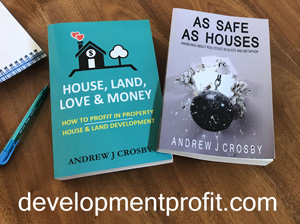In my latest book currently under penmanship I am writing the part that deals with decision making under uncertainty – pretty much the day to day life for any real estate developer! Along with some of the more academic approaches, like scenario analysis, expected monetary value and stress testing, I include what you would not normally find in any text: ‘gut feel’, ‘winging it’ and ‘back up options’. That’s because this is often the reality! Here’s the draft text so far…
Excerpt from upcoming publication, due for release early 2019.
Gut Feel
You might not find this heading in any academic publication, but often real estate development decisions are made on gut feel. So what is gut feel?[1] Well on the surface it’s your first or strongest instinct about what is best to do when presented with a decision. Geil Browning, Founder and CEO, Emergenetics International, tells us that “There is no such thing as a purely rational decision. The brain uses a combination of logic and emotion when making decisions of any kind.”[2] That emotion is your intuition and it is the semi-scientific driver behind what people commonly refer to as their gut feeling.
One’s intuition develops over time and is guided by learning, culture, ethics, technical knowledge, empathy, risk tolerance and most importantly experience – especially the success or failure they have already had in similar situations. A gut feel from an experienced practitioner could be more accurate than any detailed research and analysis, given the myriad of assumptions that are required in property development decisions. But, the gut feel of a novice is more likely to reflect underlying opinions influenced by a relatively myopic experience bank.[3]
So when someone tells me they have made a gut decision, I am going to be heavily persuaded if they are a successful industry leader and have been there and done that multiple times. For anyone else, show me the data and convince me of your reasoning please!
Winging It
Did he really put this in a book? How can anyone take this author seriously? Real estate development is a risky business venture. Taking over a project that has already failed is arguably even riskier. The reality is although we may like to think we have fully analysed a situation, luck[4] will play a part. You can help make your own luck by avoiding stupid mistakes and learning as much you can from knowledgeable others before acting. But nothing beats learning from experience. At the end of the day, when confronted by a decision in a new situation or under unique circumstances where you have no experience you will be to some degree winging it. So acknowledge that this is the case.
Once you accept that your pending decision is based on taking a risk with the outcome dependent at least partially on hope (i.e. ‘winging it’) you can still apply a modicum of common sense. For these types of decisions at least ask yourself – and analyse – “what’s the worst that can happen?”. By definition there is no limit to how bad something can get so it has to be thought of somewhat pragmatically. If that worst case outcome is financial ruin, well now you know. Then balance that with the equivalent best case scenario and your internal risk tolerance gauge will do the rest to guide your decision. Just remember, this project has already failed once, probably caused by a lot of unnecessary winging it in the first place.
You can also ask yourself, if it does all go downhill, “what are my backup options?”
Backup Options
To me real estate development is so exciting precisely because there are often so many options. On the same piece of urban residential land you could build a big house, three terrace homes or ten apartments[5]. In the CBD you could build an office tower, a hotel, a condo complex, a shopping center or all four combined!
The goal for any property development project is to maximise profit. That means finding and gaining approval for the highest and best use for the land. Having some backup options analysed and planned for just in case that highest and best use does not prove so might be a good idea. The higher the risk the better the idea! They may not be as financially attractive on paper, but could save an own goal in a deteriorating situation. If you have done your due-diligence thoroughly enough when looking to take on this failed project you will already have explored many of these potential backup options.
You might be the kind of person who says they have two plans for the project: “Plan A and Plan B: refer to plan A” to build motivation and focus in the troops. Yet if its other people’s money you should have thought about, and preferably planned for in advance at least one backup option.
Footnotes:
[1] There is a growing body of research that delves into extracting the science behind ones ‘gut feel’. Here are some articles to get you started:
http://www.medicaldaily.com/your-gut-feeling-way-more-just-feeling-science-intuition-325338
https://www.livescience.com/54825-scientists-measure-intuition.html
[2] https://www.inc.com/geil-browning/go-with-your-gut-trusting-your-intuition.html
[3] Of course this book can help increase the indirect experience bank!
[4] In this context ‘good luck’ can be defined as the convolution of external and uncontrollable factors that conspire to positively improve the results from this decision.
[5] If zoning permits! – of course you always have the option to challenge the zoning.
Cheers
Andrew Crosby
Real estate development books now available via Amazon or direct from publisher in New Zealand. Contact publishing@aenspire.com for special rates. Go to www.developmentprofit.com to view publications available.

